Is it worth buying a cheap £90 KD1879 welder? My impressions and tests
Hello.
A few days ago a colleague sent me a link to a well-known auction site leading to a welding machine for less than £90. I don't think anyone with a bit of technical imagination could be so naive as to believe in the miraculous performance of the device. However, I decided to sacrifice the equivalent of 5 packets of cigarettes and buy this marvel marked KD1879.
.
The inscription IGBT-330 and the parameter declaration in the manual suggest that this is the maximum welding current at 60% cycle. I don't know if measuring with digital clamps would be reliable with such distorted waveforms, so I let it go for a while and focused on the purely functional qualities. First, of course, I took a closer look at the device.
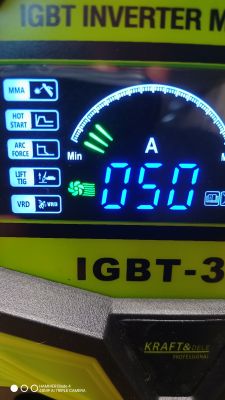
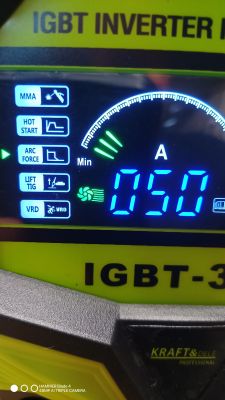

The display is very easy to read and changing parameters via the push-button encoder is convenient. I then turned my attention to the leads, pleasantly soft and long enough. The electrode terminal holds firmly, as does the ground terminal.
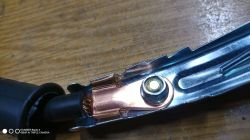
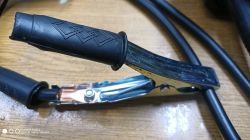
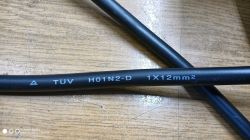
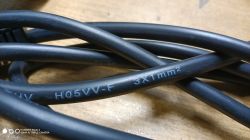 .
.
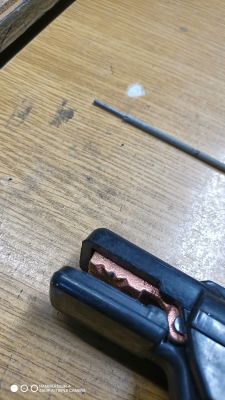 .
.
The wires have a wicked cross-section, but they are copper. In my opinion, for this type of device the absolute minimum is 16 mm² on the secondary side and 3x2.5 mm² on the primary.
Inside the welder you will find nothing interesting. Here, copper has already been abandoned in favour of aluminium both for the current leads and for the choke.
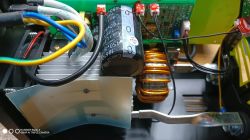
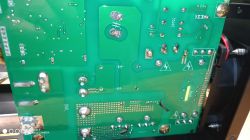 .
.
I am absolutely not a welder, no one has taught me to weld in my life, I've sloughed off maybe 2kg of electrodes, so I don't feel competent to comment on the end result. To the question of whether it works? Yes, it welds somehow.
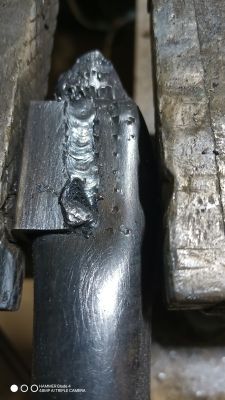 .
.
Finally, impressions:
1. I have to set a higher current than in the old Dedra 160A to get the same melt with the same electrode. I will do this weld on the photo (2.5 mm electrode) with the Dedra at a setting of 70-80 A, here I had to set 125 A, which makes me think that we are dealing with "Chinese amps".
2 Either the non-contact arc ignition doesn't work, or I don't know enough. This is the first welder with this feature I've got to, so maybe I'm doing something wrong.
3. the welder is extremely handy, lightweight, and so if it doesn't fail too quickly I'll be happy to take it on away jobs for those reasons. Of course, we're talking about simple jobs (on fences, gates and other lightweight structures) that I can handle myself without calling in a professional.
A few days ago a colleague sent me a link to a well-known auction site leading to a welding machine for less than £90. I don't think anyone with a bit of technical imagination could be so naive as to believe in the miraculous performance of the device. However, I decided to sacrifice the equivalent of 5 packets of cigarettes and buy this marvel marked KD1879.
.
The inscription IGBT-330 and the parameter declaration in the manual suggest that this is the maximum welding current at 60% cycle. I don't know if measuring with digital clamps would be reliable with such distorted waveforms, so I let it go for a while and focused on the purely functional qualities. First, of course, I took a closer look at the device.



The display is very easy to read and changing parameters via the push-button encoder is convenient. I then turned my attention to the leads, pleasantly soft and long enough. The electrode terminal holds firmly, as does the ground terminal.



 .
. .
.The wires have a wicked cross-section, but they are copper. In my opinion, for this type of device the absolute minimum is 16 mm² on the secondary side and 3x2.5 mm² on the primary.
Inside the welder you will find nothing interesting. Here, copper has already been abandoned in favour of aluminium both for the current leads and for the choke.

 .
.I am absolutely not a welder, no one has taught me to weld in my life, I've sloughed off maybe 2kg of electrodes, so I don't feel competent to comment on the end result. To the question of whether it works? Yes, it welds somehow.
 .
.Finally, impressions:
1. I have to set a higher current than in the old Dedra 160A to get the same melt with the same electrode. I will do this weld on the photo (2.5 mm electrode) with the Dedra at a setting of 70-80 A, here I had to set 125 A, which makes me think that we are dealing with "Chinese amps".
2 Either the non-contact arc ignition doesn't work, or I don't know enough. This is the first welder with this feature I've got to, so maybe I'm doing something wrong.
3. the welder is extremely handy, lightweight, and so if it doesn't fail too quickly I'll be happy to take it on away jobs for those reasons. Of course, we're talking about simple jobs (on fences, gates and other lightweight structures) that I can handle myself without calling in a professional.



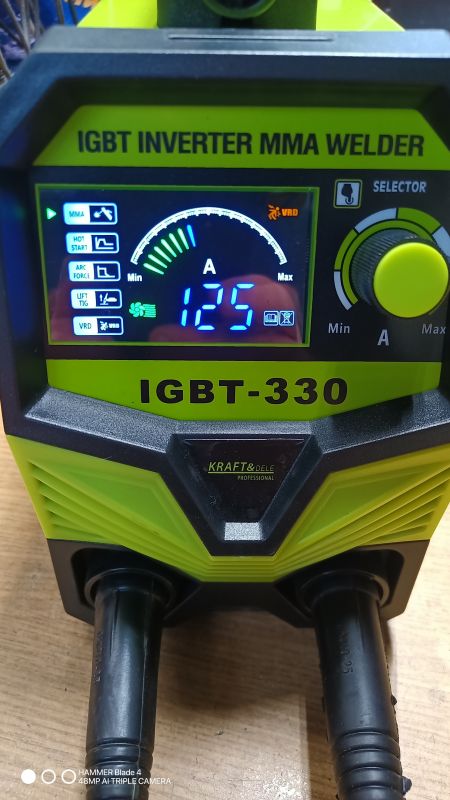
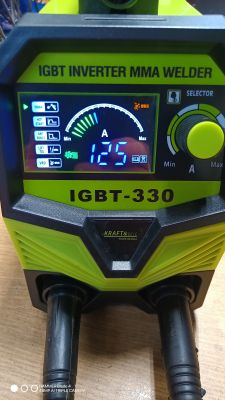
Comments
Hello, very interesting topic. I myself purchased a KD welder over two years ago, from a claimed 330 A the measured max was 145 A. [Read more]
. So Chinese "amps", as in everything they make, anyway. [Read more]
. A little short of amps, I decided to purchase another one, but the same one was no longer available. I acquired a similar one, it turned out to be the same inside, I connected two in parallel on the... [Read more]
I was fully aware that the parameters were overstated by a minimum of two times. As soon as I unpacked the box and saw the wires I was sure. On the other hand, let's be honest: how many times do you use... [Read more]
In total the whole thing cost me £300, a negligible cost, I moved the cables from an old 35mm welder. I have to say that in a dual configuration it works well. I would also add that the sound when welding... [Read more]
You probably don't need the diodes, they are galvanically separated on the secondary. [Read more]
Well, when you buy a welder for £90 it's not much to expect, but still, better that than none at all. :p [Read more]
Thanks for sharing the review. I didn't think prices had come down that much. And as recently as 20 years ago I was assembling the welder myself and winding the trafo myself. What a time. Send me a Parcel... [Read more]
I admit that such a topic was not expected. Is the author sure that the wires are copper and not just copper plated? Such welders have 120-140 A maximum. These functions on the display are probably a pic... [Read more]
All the cheap welders have inflated amps. I have a KD836 welder, to make it weld as well as a Spartus 210E at 60 amps, you have to set the current to 130 amps, on top of that the arc strike with the Spartus... [Read more]
For the price, a very good machine. Ideal for allotment work where something needs to be "greased up" once every 3 years. [Read more]
I will add from myself that in the display sits STM8S003, stabilizer and encoder (+ small thing) however it looks a bit like there is a measurement (yellow wire) Obviously a motherboard based on the ... [Read more]
. There is no such thing on this welder. [Read more]
A classic layout in this type of device. Number of keys and rectifier diodes kept to a minimum. Transformer minimalist too, but what to expect from a device priced at a set of decent keys and diodes for... [Read more]
The wires are copper, I distinguish copper from copper plated ones made of aluminium, steel or fibreglass (because I have seen those too). But the cross-section is as I wrote. What is aluminium is the... [Read more]
It got more expensive because the promotion was on allegro days (until Sunday). These bargains on welders have been appearing periodically lately, so it is not out of the question that it will be even... [Read more]
. This is something that probably everyone has. If not a resistor and relay circuit, then a thermistor circuit. [Read more]
Reading the comments under other models of such welders, one can tell that the Chinese like to save money and can give no soft starter and knock out fuses several times before they start working normally.... [Read more]
I once bought a Kraft welder like this, for occasional snotting. As I was making a grape stand out of a profile, I thought I was about to grab that welder by the strap and.... it over the fence! I don't... [Read more]